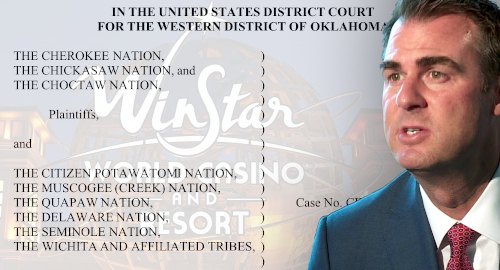 Oklahoma’s tribal casino operators have prevailed in their legal battle with the state’s governor over the renewal of their gaming compacts.
Oklahoma’s tribal casino operators have prevailed in their legal battle with the state’s governor over the renewal of their gaming compacts.
On Tuesday, US District Court Judge Timothy DeGiusti issued a ruling that affirmed the automatic renewal of gaming compacts between the state and tribal casino operators on January 1, 2020. The compacts are therefore valid for a new 15-year term following the expiration of their original agreement.
The dispute dates back to last summer, when Gov. Kevin Stitt announced that he would seek a higher share of gaming revenue for the state than called for in the original 2004 deal with the tribes. The tribes pay variable rates of 4-10% while Stitt (pictured) suggested a 20% cut of revenue was justified in exchange for casino exclusivity.
The tribes said they were willing to renegotiate the terms if Stitt acknowledged that the compacts automatically renewed at the start of 2020. When he refused to accept the renewals, the Cherokee, Choctaw and Chickasaw nations sued Stitt in federal court. A handful of other Oklahoma tribes eventually joined the suit.
The tribes’ argument centered on a clause in the 2004 compact that ensured automatic renewal on the same terms if state racetracks were also approved to offer electronic gaming through “any governmental action of the state or court order.”
As early as 2005, the Oklahoma Horse Racing Commission (OHRC) began issuing electronic gaming licenses to not only tribal casinos but also to racetracks, including two electronic gaming approvals issued to Remington Park and Will Rogers Downs last October. The tribes viewed the issuance of these licenses as ‘governmental action.’
Stitt claimed that the OHRC originally authorized track licenses before the compact took effect, and thus last year’s licenses were just the fulfillment of “mandatory administrative requirements,” which Stitt argued didn’t qualify as any new ‘governmental action.’
Judge DeGiusti didn’t buy Stitt’s “narrow view” of what constituted government activity, and found that OHRC had clearly issued electronic gaming licenses to tracks following the effective date of the compact. As such, “no more was required” for the automatic renewal of the compact. DeGiusti gave the parties until August 7 to put forth any other issues that may remain in the dispute.
This is the second time in as many weeks that Stitt has come out on the losing end of a legal fight over tribal gaming compacts. Last week, the Oklahoma Supreme Court ruled that Stitt had exceeded his authority by approving expansive new compacts with two tribes not party to the renewal lawsuit.
That latter fight cost the state over $1.5m in legal costs, a bill that state officials outside Stitt’s office say wouldn’t have been necessary had the governor not chosen to exclude them from the compact negotiation process.